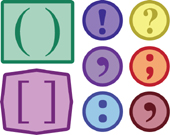 The hyphen (-) is a punctuation mark that is used in English to join words or parts of words. Here are some guidelines for using the hyphen in English:
The hyphen (-) is a punctuation mark that is used in English to join words or parts of words. Here are some guidelines for using the hyphen in English:
- Compound adjectives: When two or more words are used together to describe a noun, they are often hyphenated to show that they should be read as a single unit. For example: "a well-known actor," "a long-term goal," "a small-business owner."
- Compound nouns: When two or more words are used together to form a single noun, they are often joined by a hyphen. For example: "Mother-in-law" or "editor-in-chief."
- Word breaks: Use a hyphen to separate syllables at the end of a line when a word is too long to fit on one line.
- Fractions: When writing fractions as words, hyphenate them if they are used as adjectives before a noun. For example: "one-third of the pie," "two-thirds of the vote."
- Prefixes: When a word is formed by adding a prefix (such as "self," "ex," or "anti") to another word, do not hyphenate the word unless the prefix is added to a proper noun or the word is a capitalized abbreviation. For example: "self-aware," "ex-husband," "anti-abortion," but "non-European," "pre-Columbian," and "mid-Atlantic."
- Suffixes: The hyphen is sometimes used to join a suffix (a word that is added to the end of a base word) to a base word, such as "editor-in-chief" or "six-year-old."
- Age: When writing someone's age as an adjective before a noun, hyphenate it. For example: "a five-year-old boy," "a twenty-five-year-old woman."
- Participles: When using a past or present participle as an adjective before a noun, hyphenate it if it comes after the noun it modifies. For example: "the decision-making process," "the decision making process," "the heart-breaking news," "the heart breaking news."
- Phone numbers: When writing a phone number, use hyphens to separate the different parts of the number. For example: "555-555-1212."
- Avoid unnecessary hyphens: It is generally best to avoid using hyphens unnecessarily. If a compound word is commonly accepted as one word, it is usually not hyphenated. For example, "online" and "offline" are now commonly accepted as single words, rather than "on-line" and "off-line."
Overall, the key to using the hyphen correctly is to pay attention to the context in which it is used. It's important to note that the rules for using hyphens can be complex, and there are many exceptions. If you are unsure about whether to use a hyphen, it's a good idea to consult a dictionary or style guide.




